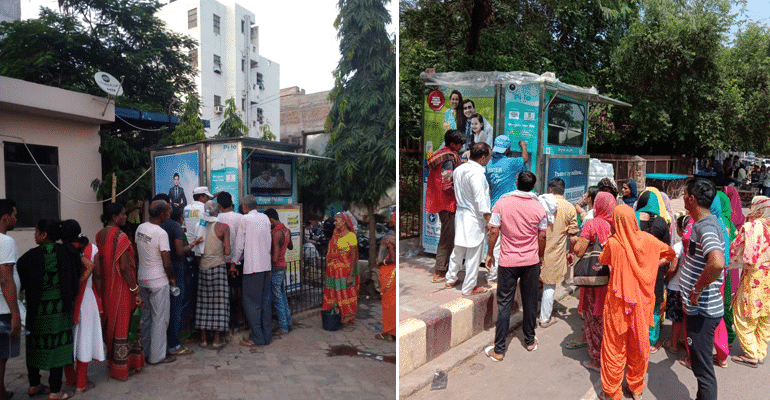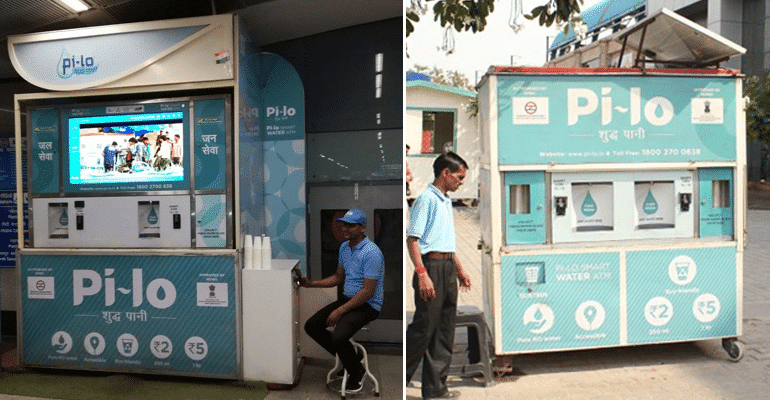Do you drink water with any emotion or getting worried about people who probably walk for 5 km to access drinking water? No. But, in Benjamin Franklin’s words, it is only “When the well’s dry, we know the worth of water.”
While we sip a glass of water or waste it from the comfort of the couch, this Delhi based organization is on a mission to bridge the gap between having contaminated water or spending 20 bucks to purchase a lire of water.
Dinesh Goyal and Jatin Ahlawat, the founders of Pi-Lo Shudh Pani Seva Foundation, in a thought-provoking conversation with Life Beyond Numbers, shared their thoughts on why it is high time to combat the financial barriers when it comes to quenching people’s thirst.

A native of Kurukshetra in Haryana, Dinesh Goyal says, “As a child, I remember that my father started a noble cause of feeding free food to hungry and needy people and the journey is still continuing but now with a vision to serve humanity by providing them with safe RO drinking water.”
Pi-Lo – a service to the community
1 liter RO water that comes in a pet plastic bottle priced at Rs.15-20 is not cheap for people from a disadvantaged background. This is where Smart water ATMs by Pi-Lo comes in.
With its mission to provide communities with safe drinking water access either for free or at very nominal rates, 117 water dispensing machines are currently functioning in over 14 cities across 5 states of India. Over time, they wish to be serving safe drinking water across India. Since all of their machines are sensor based, the live statistics about the volume of water served, people served etc. can be monitored at the real-time on their official website.

A brainchild of Goyal and Ahlawat, Pi-Lo is creating generalized and focused awareness related to water purity, water waste management and the effect of plastic pollution caused by pet water bottles. With a mission- water for all and plastic free India, this organization has established the smart water ATMs across Delhi.
The water dispensing machines
From the very start, the emphasis has been given on making these machines eco-friendly. Most of the smart water ATMs are solar powered, uses 100% recyclable paper glasses, has Real-time display and Server Monitoring of Water Quality (TDS, Temp, pH), centralized server connectivity, backlit & LED Screens, CCTV camera, Wi-Fi, Dustbin, and all most zero percent human intervention.
Another positive of these machines is that it reduces water wastage to almost 5%. The usual rate of water wastage in RO filters is as high as 40-50% of the input water. With their Zero Liquid Discharge technology, 95% of the input water is made available for consumption.
The machines directly take the water from the groundwater (unprocessed non-filtered water) and pass it through the process of integrated filtration-RO Mechanism which is a multi-step process. Thereafter, the RO filtered water enters in the chiller tank where its temperature is maintained as per the suitability and requirement. The water can then be taken out with the help of push button/coin/card acceptor through the water dispensing mechanism using the solenoid valves (SV) on and off the interface.
Jatin Ahlawat, who hails from Bijnor in UP was born in a farmer’s family. “Being the son of a Farmer I always had a knack for humanitarian services. As a child, I remember how purity was given utmost importance in everything. Since childhood, water conservation activities at the village level has always moved me and this has triggered me to do greater good to mankind by serving them pure and safe drinking water.”
Now the organization has a team of 167 members, including staff members, operators, and volunteers. The NGO sensitizes people regarding water conservation and asks volunteers to chip in and help them solve real-time water-based issues of society.

The expenses related to the whole process is covered through donations, CSR funds, and branding on Pi-Lo Smart Water ATMs. If you want to know how many lives have changed for better because of this initiative, the live statistics can be seen on their official website.
Pi-Lo – The Kumbh 2019 impact
It is always observed that in any mass religious gatherings such as Kumbh Mela, a bulk of countless plastic bottles are wasted, adding to the pollution. Hence, this year, the organization participated in the Kumbh Mela and installed 30 Pi-Lo Jal Mandir. Their machines have served 5,122,892.75 liters of safe drinking water to 20,490,713+ people, eradicating 20,490,713+ plastic bottles/glasses in Kumbh this year. Due to their presence in Kumbh, many devotees avoided water pouches and single-use plastic water bottles and kept the Sangam free to quite an extent from plastic pollution.
Post the Kumbh Mela, all the 30 machines are now moved to different new locations for installation in various public and religious places.
What’s more?
Apart from the smart water ATMs, it has also developed Portable Sewage Treatment Plant (STP) using Membrane bioreactor (MBR) Technology. The Portable STP is full-fledged in all aspects, hence avoiding any requirement of RCC chamber. Further, as every Delhi metro station is now having public toilets connected directly to drainage, the NGO has requested DMRC for a pilot run. Hence, using this Portable STP with MBR Technology without any Civil/construction work, they can recycle 98% water in toilet flushes and it can also be used as chiller in underground Metro Stations.
Pi-Lo is now using the power of social media to create awareness and has been organizing Nukkad Natak, poetry, etc. themed on solutions related to water problems. To keep the wheel of awareness rolling, Pi-Lo supports Swasth Bharat Abhiyan, Skill India, Digital India and Make in India as well.
“With a vision to serve humanity as this is the best thing we can give back to our Mother Nature, we promote the education of Girl child as we believe that when you invest in a Girl’s education, she feeds herself, her children, her community and her Nation,” says Goyal.
When you are happy inside, you can shield yourself with confidence and take care of others as well. Therefore, the organization is now motivating the youths, in particular, to come forward and take some social responsibility. Through this initiative, Pi-Lo wants to give a message to pave the path for a sustainable life for all, a life that cares for humanity, irrespective of anyone’s social status.

